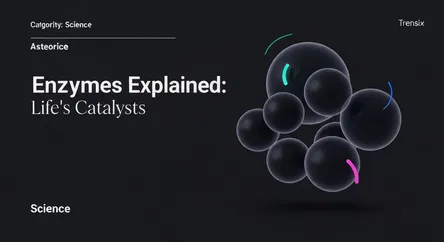Science
Enzymes Explained: Life's Catalysts

Discover enzymes, the protein catalysts that speed up chemical reactions essential for life. Learn how they work and why they're so important.
What is it?
An enzyme is a biological catalyst, almost always a protein, that accelerates chemical reactions within cells. They are essential for life, participating in everything from digestion to DNA replication. Each enzyme has a unique three-dimensional shape, including a specific region called the active site. This site binds to a particular molecule, known as a substrate, much like a lock and key. Once bound, the enzyme facilitates the conversion of the substrate into a product, releasing it and becoming available to catalyze another reaction. This specificity and efficiency make enzymes incredibly powerful biological machines.
Why is it trending?
Enzymes are at the forefront of biotechnological innovation. The development of technologies like CRISPR-Cas9, an enzyme system for gene editing, has revolutionized genetic research and medicine. In industry, engineered enzymes are used to create biofuels, improve detergents, and process foods more efficiently. Their role in diagnostics is also expanding, with enzyme-based tests used to detect diseases by measuring the levels of specific enzymes in the blood. This growing application in medicine, industry, and research keeps them a hot topic.
How does it affect people?
Enzymes are fundamental to human health and daily function. Digestive enzymes like amylase and lipase break down the food we eat into absorbable nutrients. Inside our cells, countless enzymes drive the metabolic processes that produce energy and build essential molecules. When an enzyme doesn't function correctly, it can lead to metabolic disorders. For example, lactose intolerance is caused by a deficiency of the enzyme lactase. Understanding enzymes is therefore crucial for diagnosing and treating a wide range of human diseases and maintaining overall health.